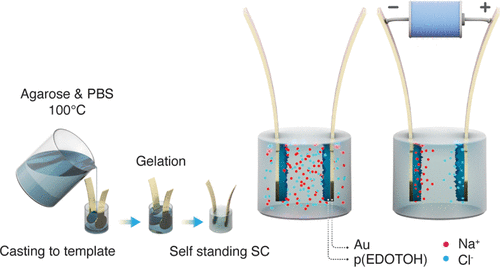
The last decade has witnessed rapid progress in the development of implantable and wearable bio(chemical) sensors, which allow for real-time, continuous health monitoring. Among different device configurations, organic electrochemical transistors (OECTs) have shown great potential in transducing weak biological signals with on-site amplification and as components of complex circuits with low power requirements. Yet, a significant technological challenge remains in the way these devices are integrated with power sources that are conventionally bulky and rigid. Here, we present a simple process to assemble a supercapacitor (SC) that is self-standing, lightweight, and biocompatible and made of two identical conducting polymer (poly(3,4-ethylenedioxythiophene) electrodes and an agarose hydrogel comprising alkali metal halides. This SC is distinguished by its high energy and power density (20 Wh kg–1 and 105 W kg–1, respectively), moderate gravimetric specific capacitance (70 F g–1), excellent stability (charge retention of 75% after 12,000 cycles), operational flexibility (can accommodate various types of aqueous electrolytes), long-lasting self-discharge (>10 h), and fast response time (between 0.1 and 30 s). We use the SC to power a micron-scale OECT, which selectively detects sodium ions in aqueous media. When miniaturized, the SC maintains its high performance and delivers a volumetric capacitance of 240 F cm–3, highlighting the possibility of fabrication in nonstandard form factors to couple with various bioelectronic devices. This low-cost and portable power source instigates the development of robust and biocompatible onboard power sources to be implemented alongside biosensors.


"KAUST shall be a beacon for peace, hope and reconciliation, and shall serve the people of the Kingdom and the world."
King Abdullah bin Abdulaziz Al Saud, 1924 – 2015
Thuwal 23955-6900, Kingdom of Saudi Arabia
© King Abdullah University of Science and Technology. All rights reserved